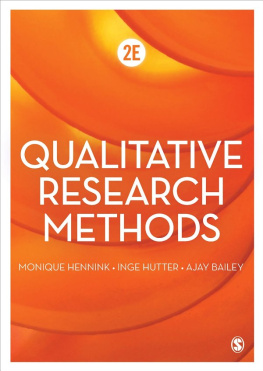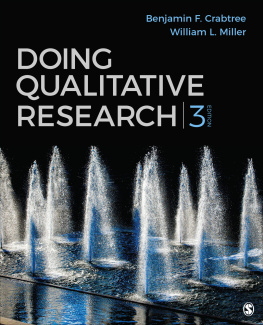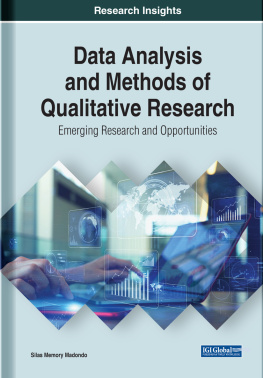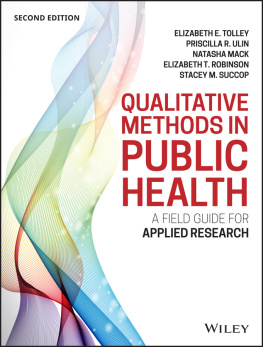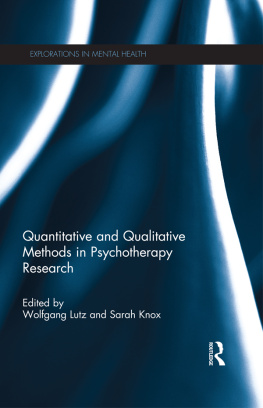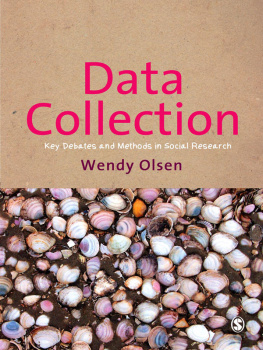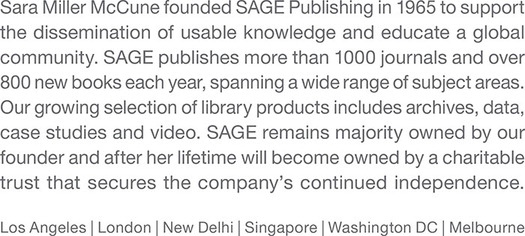Qualitative Research Methods
Qualitative Research Methods
2E
- Monique Hennink
- Inge Hutter
- Ajay Bailey

- Los Angeles
- London
- New Delhi
- Singapore
- Washington DC
- Melbourne
SAGE Publications Ltd
1 Olivers Yard
55 City Road
London EC1Y 1SP
SAGE Publications Inc.
2455 Teller Road
Thousand Oaks, California 91320
SAGE Publications India Pvt Ltd
B 1/I 1 Mohan Cooperative Industrial Area
Mathura Road
New Delhi 110 044
SAGE Publications Asia-Pacific Pte Ltd
3 Church Street
#10-04 Samsung Hub
Singapore 049483
Authorial arrangement Monique Hennink, Inge Hutter and Ajay Bailey 2020
Chapters 4 and 12 Inge Hutter, Christine Fenenga, Monique Hennink, and Ajay Bailey 2020
First edition published 2010
Reprinted 2011 (twice), 2012, 2013, 2014, 2015, 2016, 2017 (three times) and 2018.
Second edition published 2020.
Apart from any fair dealing for the purposes of research or private study, or criticism or review, as permitted under the Copyright, Designs and Patents Act, 1988, this publication may be reproduced, stored or transmitted in any form, or by any means, only with the prior permission in writing of the publishers, or in the case of reprographic reproduction, in accordance with the terms of licences issued by the Copyright Licensing Agency. Enquiries concerning reproduction outside those terms should be sent to the publishers.
Library of Congress Control Number: 2019943750
British Library Cataloguing in Publication data
A catalogue record for this book is available from the British Library
ISBN 978-1-4739-0390-6
ISBN 978-1-4739-0391-3 (pbk)
Editor: Alysha Owens
Assistant editor: Charlotte Bush
Production editor: Martin Fox
Marketing manager: Susheel Gokarakonda
Cover design: Sheila Tong
Typeset by: C&M Digitals (P) Ltd, Chennai, India
Printed in the UK
At SAGE we take sustainability seriously. Most of our products are printed in the UK using responsibly sourced papers and boards. When we print overseas we ensure sustainable papers are used as measured by the PREPS grading system. We undertake an annual audit to monitor our sustainability.
Qualitative research humanizes science
Contents Introduction contents Part I Contents Part II Contents Part III Contents
Figures
Tables
Case studies
About the Authors
The first edition of this book was initiated jointly by Inge Hutter and Monique Hennink, who developed training workshops in qualitative research methods for academic researchers and graduate students. These training courses were conducted during the late 1990s until 2002 in many developed and developing countries including China, India, Pakistan, Uganda, Malawi, South Africa, Tanzania, Kosovo, France, Germany, Sweden, Netherlands and USA. Ajay Bailey later joined as an instructor on some of these workshops. These workshops and our extensive experience in applying qualitative research in diverse research settings provide the backdrop for the content of the first and second editions of this book.
Monique Hennink* is an Associate Professor in the Hubert Department of Global Health, Rollins School of Public Health at Emory University in the USA. She is trained in demography and conducts qualitative and mixed methods research in globally diverse settings. Her research focuses on understanding socio-cultural and behavioural aspects of public health issues, particularly sexual and reproductive health, often to develop effective health interventions. She teaches graduate-level courses on qualitative research and mentors Doctoral and Masters-level research students in Public Health, Behavioural Sciences, Nursing, Sociology, Epidemiology and Medical Sciences. She also developed the
QUAL-WORKS program to train public health professionals in qualitative research. Throughout her teaching and mentoring of qualitative research, she encourages balancing methodological rigour with the practical realities of global field research. She has authored other textbooks on
International Focus Group Research (2007) with Cambridge University Press and
Focus Group Discussions (2014) with Oxford University Press. She has also published articles on qualitative methodology, including research experiments on saturation and sample size for qualitative studies; the quality of transcription via court reporters; and using interpreters and translators in qualitative research.Inge Hutter* is a Professor of Participatory and Qualitative Research in Population and Development at the International Institute of Social Studies (ISS), The Hague, of Erasmus University in Rotterdam, the Netherlands. She is trained as a non-western demographer and a cultural anthropologist and conducted extensive fieldwork in India and Cameroon. She has been involved in many qualitative PhD research and research-for action projects in the Netherlands, USA, Asia and Africa. Her own research focuses on culture and (reproductive) health and the application of qualitative research within the quantitative discipline of demography. Listening to people, hearing their voices and situating them in the cultural context in which they live, is the central theme of her research work. She wants her research to lead to not only academic knowledge but also to contribute to actions and interventions, in partnership with other societal stakeholders such as policy makers and non-governmental organizations. In this light, a participatory approach to qualitative research was co-developed. Several joint research projects in India, Kosovo, Malawi, Ghana and the Netherlands demonstrate this participatory approach to qualitative research. Thus, she believes not only that qualitative research humanizes science, but that qualitative research can also contribute to improving the well-being of people and enhancing social change in society.
(*Both authors contributed equally to this book)Ajay Bailey is an Associate Professor of Transnational Mobilities at the Department of Human Geography and Spatial Planning, Utrecht University in the Netherlands. He leads the research line Global Migration, Culture and Place working at the interface of anthropology, geography, demography and public health. He holds the prestigious Dr T.M.A. Pai Endowed Chair in Qualitative Methods at Manipal Academy of Higher Education, India, named after Dr Tonse Madhav Ananth, the founder of the university. With his Chair, he coordinates the Transdisciplinary Center for Qualitative Methods a joint initiative with Manipal Academy of Higher Education. To develop this research line he has been awarded more than 1.5 million in grant funding by a number of organizations such as NWO/Dutch Organization for Scientific Research, Ubbo Emmius Foundation, Gratama Foundation, amongst others. As an anthropologist and a cultural demographer, he has produced more than 30 top peer-reviewed international publications; one highly cited monograph; and has supervised nine PhD researchers. He is passionate about qualitative research, teaching, and capacity building of young researchers. His work significantly contributes to expanding the field of transnational mobilities, ageing, inter-generational relations, health systems research, health services, reducing barriers to care, while establishing meaningful NorthSouth and SouthSouth collaborations.

